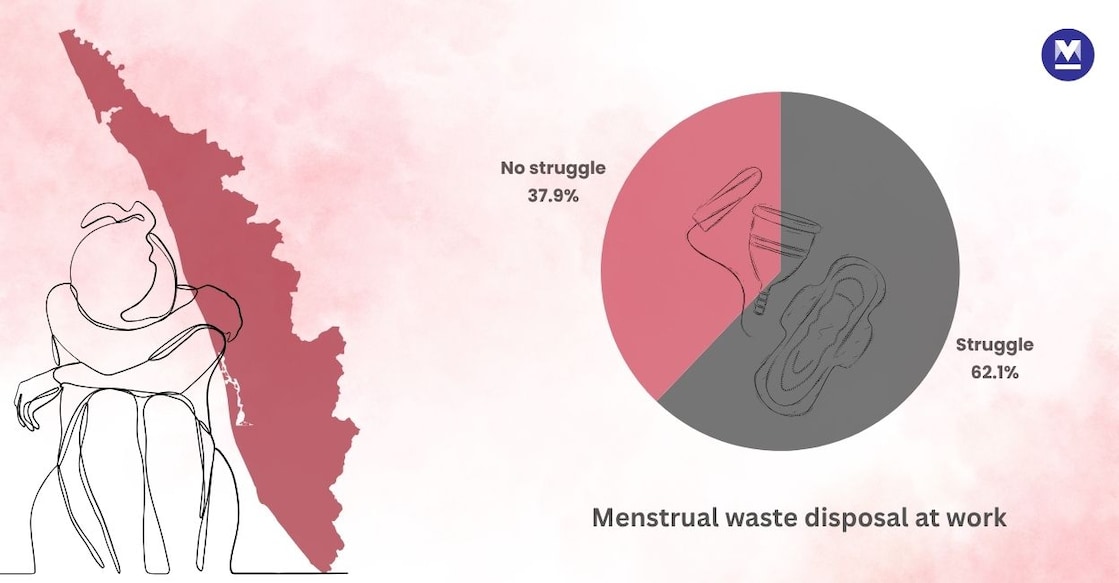62% working women struggle with menstrual waste disposal in Kerala, 24% report infections: Study

Mail This Article
Kerala may have moved past the days of cloth napkins and period taboos, but workplaces in the state are yet to catch up. A new pilot study in the formal sector has uncovered alarming gaps in menstrual hygiene management (MHM) across offices and institutions, showing how far we still have to go in making workspaces inclusive and supportive for women.
Nearly 62.3 per cent of working women reported difficulty disposing of menstrual products due to inadequate facilities at their workplaces. Over half of the respondents experienced both physical and mental discomfort during their menstrual cycles, often caused by unhygienic conditions and a lack of privacy. A staggering 71 per cent said they had to bring their own menstrual hygiene products to work, with no access to supplies on site. The figures are likely to worsen if the informal sector is included in the study.
Published in the International Journal of Community Medicine and Public Health, the study highlights how poor MHM impacts women’s physical health, mental well-being, and workplace productivity. Led by Dr Manju Koshy, along with Dr Fezeena Khadir, Dr Sumina Cheriyan, and Dr Bindu Kumari, the research surveyed 231 working women aged 18 to 45 from diverse sectors. The study was conducted at Sree Uthradom Thirunal Academy of Medical Sciences (SUTAMS), Thiruvananthapuram. While the study’s sample size limits broad generalisations, it offers valuable insight into the availability of menstrual products, disposal infrastructure, and the emotional and logistical challenges menstruating women face at work.
“We collected data from women across Kerala working in sectors like healthcare, education, IT, and banking. What’s surprising is that the situation is equally poor across all sectors,” the research team behind the pilot study told Onmanorama. “Women are expected to maintain productivity in environments that don't even cater to their basic biological needs. Many of the respondents complained that washrooms lacked proper flush mechanisms or lighting. This needs to change.”
The study also found that a majority of the participants (62.3 per cent) were found using sanitary napkins over other alternate menstrual products like tampons, menstrual cups etc. According to the National Family Health Survey (NFHS-5) 2019–21, the use of hygienic menstrual protection among women in Kerala rose to 93.3 per cent, up from 90 per cent in the previous survey. Among the respondents, a vast majority (90.6 per cent) reported using sanitary napkins, while 40.2 per cent also relied on cloth. The use of tampons and menstrual cups remained extremely limited, at just 0.1 per cent and 0.2 per cent, respectively.
The psychological distress experienced by women during menstruation was also looked at. Results showed that 46.3 per cent of respondents reported reduced work efficiency, while 24.2 per cent reported symptoms of reproductive tract infections such as itching, vaginal discharge, and pelvic inflammation--conditions potentially linked to poor menstrual hygiene.
The paper argues that the absence of menstrual-friendly infrastructure is not just a health concern, but a workplace equity issue. “Providing access to clean toilets, private spaces for changing, and safe disposal of sanitary waste is not a luxury--it is a necessity,” the authors state.
Kerala has implemented several local initiatives to improve menstrual hygiene, with as many as 140 grama panchayats and 10 block panchayats launching projects to distribute cotton napkins and menstrual cups. However, these efforts may not be enough. The study calls for urgent policy interventions across both private and public sectors to ensure more consistent and systemic change. Key recommendations include enforcing gender-sensitive WASH (Water, Sanitation and Hygiene) standards in workplaces, incorporating menstrual hygiene into occupational safety norms, and enabling public–private partnerships to ensure access to sanitary products and proper disposal systems.
It also stresses the importance of challenging cultural taboos, education and social awareness. “Workplace silence around menstruation adds to the psychological burden and social invisibility of working women. Menstrual health is a public health issue and must be treated as such,” the paper notes.


